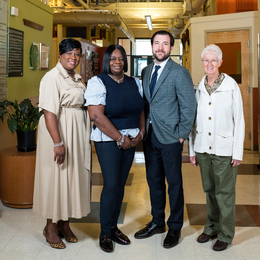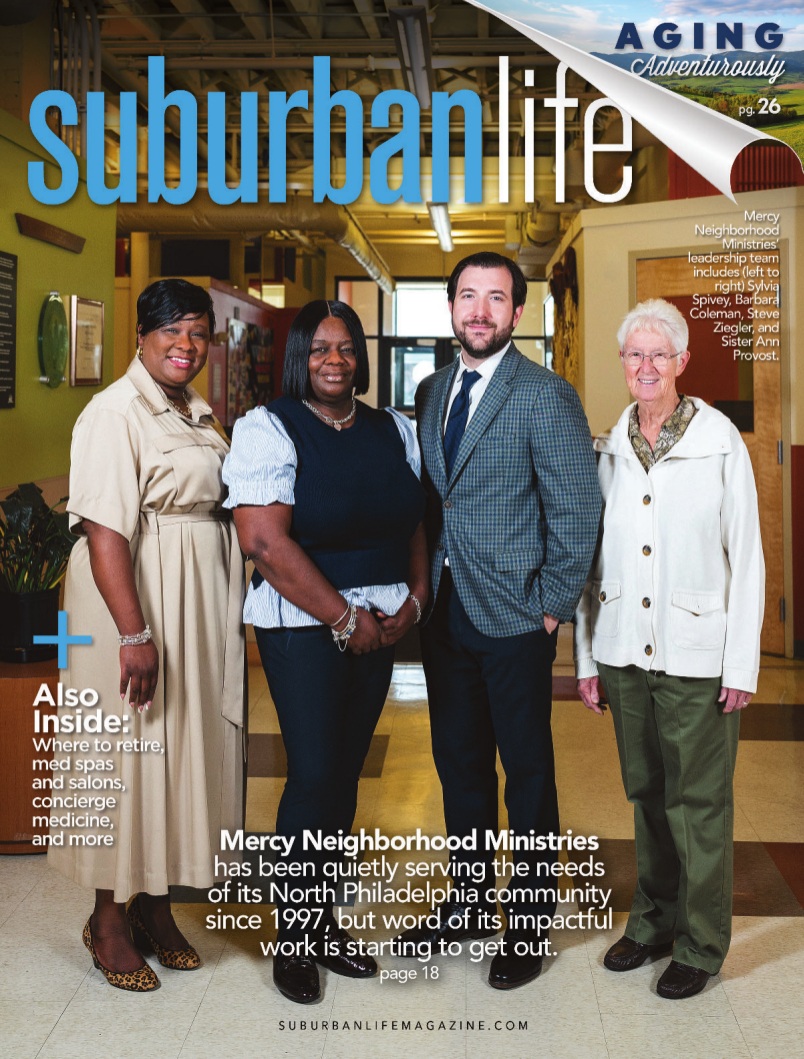
A Hidden Gem
Mercy Neighborhood Ministries has been quietly serving the needs of its North Philadelphia community since 1997, but word of its impactful work is starting to get out.
As someone with two decades of experience in the nonprofit sector, Sylvia Spivey has seen countless examples of dedicated organizations making a meaningful impact in people’s lives. Five years ago, a visit to a renovated building in North Philadelphia called the Mercy Family Center changed the trajectory of her career. Touring the center, which serves as the main headquarters of Mercy Neighborhood Ministries, opened her eyes to the admirable work being done inside its walls for local residents of all ages.
“What particularly drew me to Mercy was how it’s an intergenerational organization,” says Spivey, now the executive director of Mercy Neighborhood Ministries. “Most people know us for our preschool program, but we serve the whole family by offering adult education and workforce development along with an adult day program. When I first found out we have toddlers and senior citizens in the same building, I knew I had to see it.
“I met with Sister Ann Provost and she walked me around the building and told me the story,” she continues. “It really inspired me and made me want to work here. I said it the first day I walked through the door and I still say it: We’re a hidden gem.”
Founded by Sister Ann in 1997, Mercy Neighborhood Ministries is the backbone of the Tioga-Nicetown community. The organization strives to create partnerships and programs that serve the needs of underserved populations in North Philadelphia. Amidst the cycle of poverty that affects roughly a quarter of the people in the area, the nonprofit aims to improve their quality of life by establishing a strong academic and economic foundation for success.
Many nonprofits focus solely on children or seniors. Encompassing the entire family sets Mercy apart from its peers.
“That’s why it’s not the Mercy Center, it’s the Mercy Family Center,” Sister Ann says. “We put family in the name because it was very important to us that this could be a place for the entire family to be serviced.”
Sister Ann had first come to the neighborhood after being assigned by the Sisters of Mercy to a local Catholic school as an educator, and she later served as the director of religious education for a parish. When the area’s Catholic schools and parishes started to close or merge and important services like afterschool programs fell by the wayside, she and another sister stepped up to offer them. Doing so led to the organization’s creation.
“We have family members participating in different programs at the same time,” adds Steve Ziegler, director of advancement and operations. “A preschool student often has a grandparent in the senior care program, or a parent or cousin in the jobs program. … We have five different services, but it could be multiple generations within one family taking advantage of those services.”
It starts with the early education piece. Mercy offers preschool for children between the ages of 3 and 5, with afterschool care for kids up to eighth grade and summer camp. The organization gives students not just the academic tools they need to succeed, but also a curriculum based on social and emotional learning. Barbara Coleman, a Philadelphia educator for more than 30 years and the program director, says the emotional aspect leads to classrooms where respect is expected and shared.
“Students are provided instruction in a welcoming environment,” Coleman adds. “They have a clear purpose when they are being instructed, can demonstrate learning in a variety of ways, and feel safe to take risks. All of this supports our students without identified needs as well as those who have been identified.
“Our instructional focus relies heavily on student discourse,” she continues. “As a result, many of our identified students become active/engaged learners within their heterogeneous peer groups and, in turn, within the classroom at large.”
In the adult education program, participants can receive assistance in GED prep, while those who already have a high school diploma and are looking to advance in their careers can get tutoring in literacy and math. The workforce development program, called A Path to Prosperity, helps with soft skills like writing a résumé, interviewing tips, and learning how to interact with co-workers. In addition, relationships with employers in the community enables the organization to help constituents earn job interviews or receive certifications and credentials that can lead to employment.
“We’re all about partnerships,” Spivey says. “If there’s something we can’t do here at Mercy, we like to connect people to other programs.”
The adult day program is based on a social-medical model; many of the participants have Alzheimer’s disease or mobility issues, so the staff includes certified nursing assistants. Even so, the chance to interact socially with peers and take part in creative activities is at the core of the program.
“Most of them also live with caregivers, so the program really provides a respite for caregivers and it gives the individuals a chance to interact with other seniors to keep their brains going,” Spivey says. “We do art therapy and music therapy, and we have the unique opportunity also for the preschoolers to do projects with the senior citizens, which is always fun.”
Mercy also has a food distribution program called Mercy Meals in which people in need can come in on Wednesdays and shop for fresh meat, produce, and other groceries.
To support all of these programs, fundraising is a major part of the mission. Ziegler leads the effort to receive assistance from the state and federal government and to apply for grants from various foundations. Mercy also depends on the generosity of about 500 active donors, and certain individuals can take advantage of the Earned Income Tax Credit (EITC) program to essentially donate 90 percent of their tax liability to the organization.
Other engaged citizens volunteer with Mercy’s various programs or to “adopt” a family or classroom during the holiday season and purchase the items on the family’s wish list.
It’s easy to see why Mercy continues to grow and expand its reach. In 2018, it opened a second location for preschool in collaboration with the nonprofit Face to Face in Germantown, and more early education centers could soon be on the horizon. Partnerships with Temple University and the Philadelphia Housing Authority have enabled the workforce development program to be offered remotely, and Ziegler envisions a day where Mercy acts as a social service network covering all of North Philadelphia.
Sister Ann, who retired a few years ago, sometimes can’t believe how far the organization has come, but she knows there are still needs to be met. Mercy has flourished because of its adaptability and a devoted staff that shares her passion for giving.
“You can hire some wonderfully talented people, but if they don’t understand the mission, then you’re missing something,” she says. “There’s a way of approaching problems differently, and if you understand the mission then you can approach them from that vision. If something is struggling, there might be a tendency to say, ‘Let’s just cut it.’ But that’s not the mission.
“We have to find a way around the problem, because it’s an important need in the neighborhood,” she continues. “We’re very blessed that our staff all feels and understands that, and that’s how they respond to whatever need there is. Sometimes we have to think outside of the box to find it, but we find it.”
Mercy Neighborhood Ministries
Mercy Family Center
1939 W. Venango Street
Philadelphia, PA 19140
(215) 227-4393
MercyNeighbors.org
Mercy Family Center
1939 W. Venango Street
Philadelphia, PA 19140
(215) 227-4393
MercyNeighbors.org
Photo by Jeff Anderson
Published (and copyrighted) in Suburban Life magazine, October 2024.



